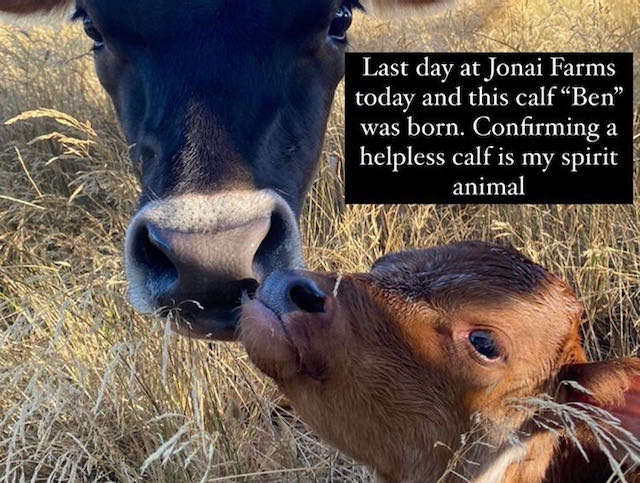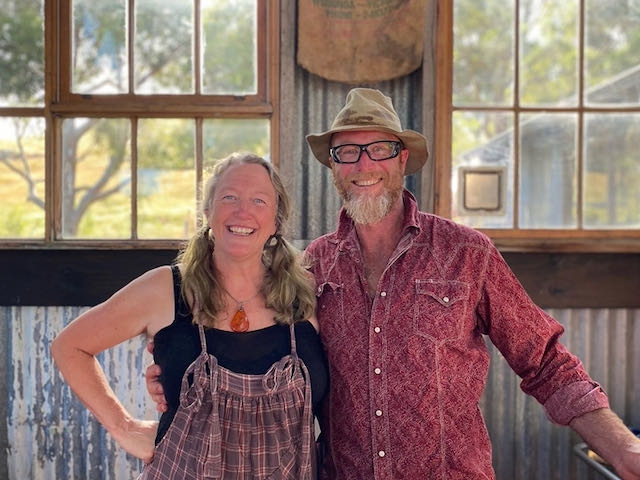I send Ben a screenshot from Kohei Saito’s latest book Marx in the Anthropocene: Towards the idea of degrowth communism:
The primary goal of capitalist production is the valorization of capital above anything else. Capitalism is driven by the insatiable desire for profit-making and constantly increases the productive capacity. In contrast, in pre-capitalist societies production was conducted for the sake of satisfying concrete needs, and correspondingly the aim of production was use-values tied to the fulfilment of finite wants.[i]
He responds:
‘Good extract! Thanks for sharing. Keen to hear what the authors suggest should replace it.’
Ben, a recent refugee from corporate Australia with a keen eye for the limitations of capitalism but foggy idea of what to do about it, was the most recent human to join our farming community for a six-week volunteer residency. Back from a weekend in the city, the conversation continued. Between bites of our slow-cooked pork and thinly-sliced Tumpinyeri Growers cabbage folded into warm corn tortillas, topped with this week’s batch of yoghurt, and last year’s pickled jalapeños, I suggest that what replaces capitalism looks a lot like pre-capitalism, which looks a lot like how we live here at what we call Jonai Farms on unceded Dja Dja Wurrung Country – djandak.
We have been working for more than a decade to farm and live in solidarity economies, and to unshackle ourselves from the last ties to capitalist commodity supply chains. Our farm has been a community-supported agriculture (CSA) farm since 2014, with 80 household members who sign up to share the risks as well as the rewards with us for a minimum of a year. We divert hundreds of tonnes of so-called waste (spent brewers’ grain, whey, out-of-date produce…) from landfill to pigs’ bellies every year, do all the butchery of our carcasses here in our on-farm butcher’s shop, and hope to sever our most vulnerable link to commodity supply chains through the construction of a micro-abattoir in the next 18 months.
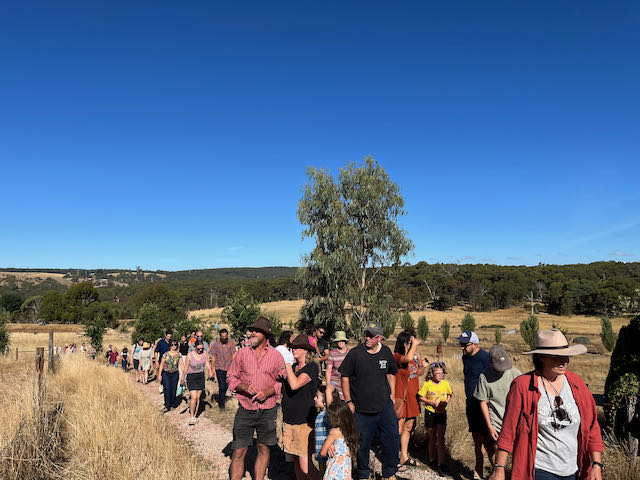
Our vision for a society that celebrates frugal abundance and radical sufficiency for all is deeply emplaced – it’s how we live here in Blamtown – our affectionate collective name for the hamlets now known as Eganstown and Blampied. My belief that abundance and sufficiency are possible for everyone in this crumbling world is rooted within and beyond the scope of my privilege to farm and live in this way. The vision is also informed by a decade of strategising and advocating arm-in-arm with the peasant and Indigenous activists of the global food sovereignty movement led by La Vía Campesina, the largest social movement in the world.
When people ask me whether the agroecology of peasants and Indigenous Peoples can ‘feed the world’, I answer that it already does. 70% of the world’s food is produced by smallholders using just 30% of the world’s agricultural land. Compare that with industrial production systems, which use 70% of the land to produce just 30% of our food.
The hegemony of neoliberal colonial capitalism is so invisibly totalising, it renders most of us ‘unable to see beyond our cognitive, moral and practical horizon’[ii]. To illustrate, Australians see vast monocultures of grain and believe that this is what we need to eat. In fact, most Australian grain is exported, and more than half is eaten by non-human animals or converted to biofuels. Australia is not feeding the world, we don’t even manage to feed all Australians (with as much as 15% of the population experiencing food insecurity in the past year). No, instead we allow those in control of what Justus von Liebig called the ‘robbery system of agriculture’ way back in 1862 to sell our water and soil in the form of commodities to middle class societies overseas[iii], to the detriment of smallholders and local communities on all sides of all the seas.
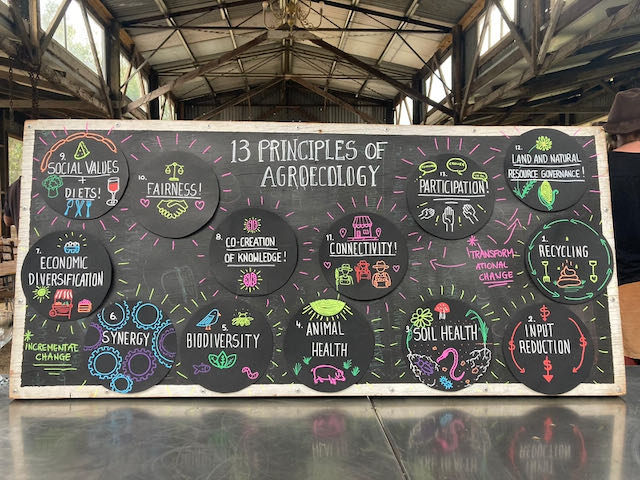
But it doesn’t have to be this way. In many parts of the world it is still not this way – though smallholders are constantly under threat from landgrabbers and development agencies (who are sometimes the same). From Brazil to Tanzania, and Sarawak to Palestine, peasants and local communities are defending their rights to territory, culture, and customary law against the exploitative and extractive incursions of capitalism. Spending time with food producers from the majority world has heavily influenced my utopian thinking, or what Ruth Levitas[iv]asserts is ‘informed, educated hope’. I carry their stories of farming, feeding, and fighting for their rights to land and water with me always – into farming, feeding and fighting here at home – as we say in the movement, ‘Globalise the struggle, globalise hope!’
Recently here on djandak, we were grateful to be welcomed to Country by Djaara woman Rebecca Phillips. Bec was welcoming us to Country as we celebrated a new collaboration between Jonai Farms and young farmers Josh and Rex of Tumpinyeri Growers, in which we are sharing land, resources, labour, and community to run our integrated small-scale farms raising pastured pigs and cattle, fruit and vegetables. Josh is a proud Ngarrindjeri and Narrunga man who interned with us for the first half of 2020 (making him a founding member of the Pandemic Posse at Jonai), and Rex is a settler descendant, and together they have operated a market garden for just over two years on leased land nearby. The collaboration with Tumpinyeri includes rent-free landsharing for farming and also for living, and Rex’s partner Shaun has also joined us as a welcome denizen, having come to us first in 2017 as an intern. Shaun is head cheesemaker at Long Paddock in Castlemaine, from where we get whey for the pigs, so one day a week he now uses our ute and trailer to collect this valuable surplus yield and bring it home on his commute, closing another loop in our endless quest for circularity.
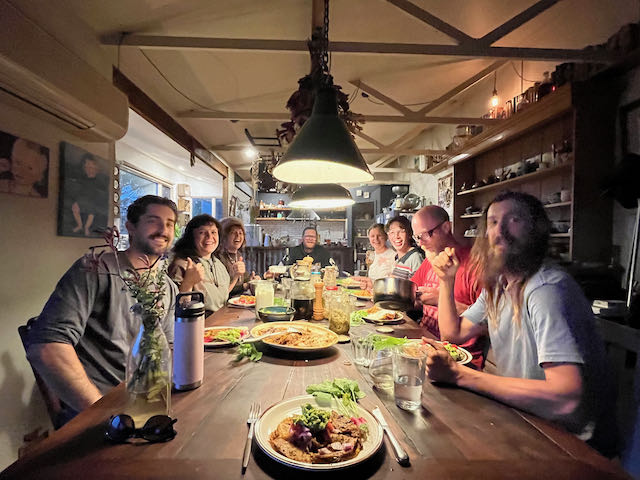
As a community, we have all committed to relational values – we value relationships over transactions – and reflect on our relationships with djandak to help guide our responsibilities with each other, other farmers and suppliers, and the communities we feed. We embrace all kinds of value – social, ecological, cultural, and economic – where all parties reciprocate commensurate with need, capacity and care. Djandak benefits from a greater number of ‘eyes per acre’ as Wendell Berry says, and from the integration of a net fertility producer (Jonai) with fertility consumers (Tumpinyeri), ensuring surplus nutrient is never configured as ‘waste’ in a well-functioning ecosystem. Where capitalist agriculture produces the metabolic rift, agroecology instead produces healthy soil to grow delicious food to feed to local communities. We acknowledge the privilege that we Jonai have in ‘owning’ title to unceded land, and seek through sharing land without rent, and through our daily practices, to break down imbalances in power or fairness in our relations with each other and with djandak.
In welcoming us to Country, Bec said that because humans are 60% water, if you drink Loddon River water, you are 60% Loddon River. When you eat food grown on Country, you are further part of that Country. ‘Country is kin,’ she reminded us. Since we drink rainwater on the farm, I wondered whether we are 60% sky, and the child within me lit up at the thought. Then I pictured the storms that often approach us from the west and northwest, and thought that perhaps we are kin to the rivers, soils, and trees of the Gunditjmara and Ngarrindjeri where those clouds form – we’re nourished by Josh’s Country. That in turn led my thoughts to djandak’s role as catchment that feeds into Dhungala – the Murray River – recharging Ngarrindjeri Country and Josh’s ancestors. This relational mind journey made me even more grateful to have opportunities to learn from Bec and other First Peoples and their sovereign Countries about ways that we can feel and meet our mutual obligations with both Land and peoples. We find that seeking out and listening to different stories are a good way to re-train our brains in counter-hegemonic structures, relationalities, and values.
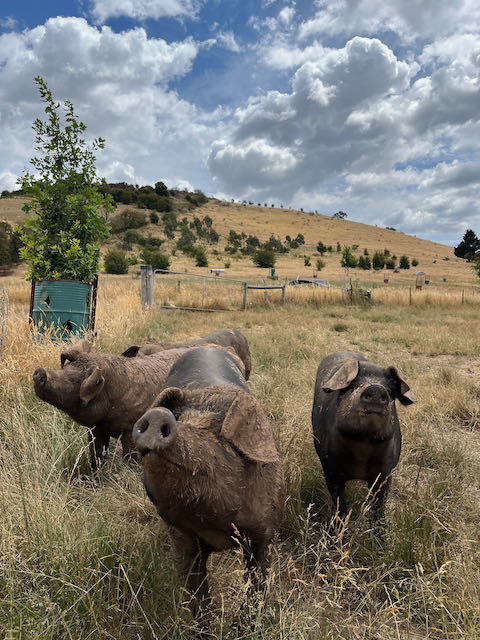
There is a growing movement towards ‘Agroecology Lighthouses’ championed by the FAO and a handful of NGOs, and in that spirit, we are lighting a beacon here on djandak – signalling the way forward to the agroecological transition so needed to deal justly with future generations. We prefer ‘beacon’ rather than ‘lighthouse’, as lighthouses were developed to keep trade moving through the night in the endless pursuit of profit, and lighthouses are lonely places that tell travellers to stay away.
Beacons, on the other hand, are lit by communities to show the way – they can be beacons of hope, and beacons of love. We light a beacon here together with deep intention to contribute to the rapidly growing movement of agroecology beacons all around the world, where smallholders are radically transforming the food system from the ground up. In settler colonial states like Australia, we are also working towards decolonial praxes and politics, while accepting the need for some transactions along the redistributive way by paying the rent.
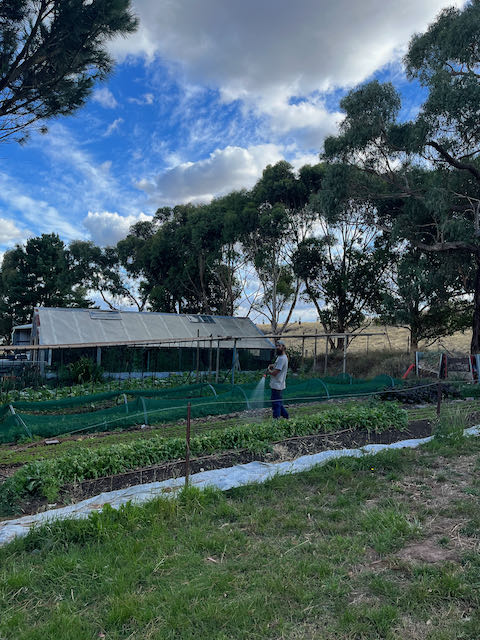
Here at the beacon, we are auto-didacts and co-conspirators enmeshed in circuits of knowledge and skills so circular and reciprocal we sometimes forget who knew something first (and quite often it was somebody on youtube). We know what comes after capitalism because we are living in the ‘world of becoming’[v]. Active in our own optimism, we grow food. And because we live in a colonial capitalist country, we fight for what we grow and eat, and we eat what we fight for at three convivial meals every day. We are utopians.
‘The first, necessary, step in utopia as method is to transform our criticism of a particular state of affairs into a genuine estrangement or alienation with that particular situation’.[vi]
Choosing to feed our community rather than the shareholders of banks is one way we manifest our rejection of capitalism’s profiteering cycle of debt. We do this by raising funds through our CSA and the broader community to build more infrastructure on the farm, exchanging the products of our labour for cash and going slowly to avoid debt. We do this also by valuing labour over capital – by doing more ourselves with less, and with old and recycled resources. Sharing rent-free land with Josh, Rex and Shaun, and lighting a beacon for agroecology is another. Alienation has never been so joyfully communal.
On his last day with us, Ben and our youngest son Atticus were present for the birth of the first calf of the year while the rest of us were helping launch Mornington Peninsula Shire’s new Food Economy and Agroecology Strategy. The little bull is our heifer Hathor’s first calf, and Ben sent us a message, saying
‘…can’t help but notice the poetry about how my (metaphorical) death of me leaving the farm is ushered in by new life the hour of my departure. I guess my spirit animal is a helpless calf – which is fitting’.
I responded:
‘We will call him Ben of Hathor!’
As we drove home the next day, we received another message from Ben, this one recommending a podcast featuring farmer-scholar Tanya Massy and Bundjalung woman and artist Ella Noah Bancroft:
‘I listened to this on the way home yesterday and thought it articulately / poignantly covered a lot of the convos we’ve been having over the last 6 weeks. E.g. transformational change, First Nations thinking, redefining cultural stories of value, enablers of decentralisation / localisation of food systems, reconnection as a meta enabler, opportunities for corporates / investors’ [to reconfigure value and embrace non-financial returns as per a new report coming out soon from Sustainable Table].
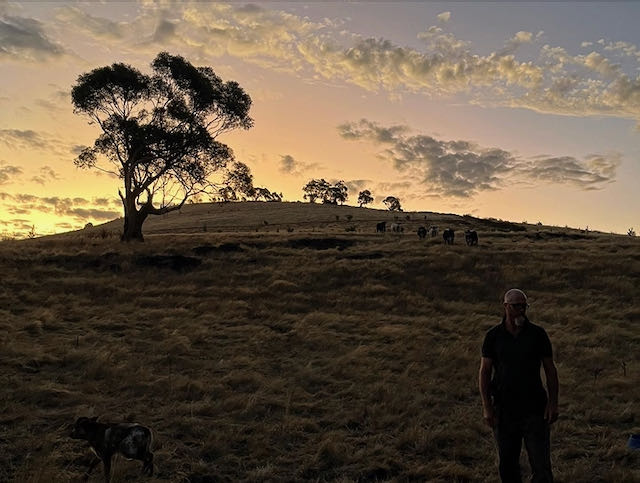
When he arrived in January, I think Ben was looking for ways to ameliorate capitalism. Today, he is leaning into his growing estrangement from hegemonic structures, and is finding more ways to distance himself from neoliberal capitalism. He told me recently that he has signed up for a working bee at the local wetlands to deepen his community connections in the city where he lives, and that he’s seeking out more local ethical food rather than just buying Big Organic from the duopoly, saying his view has ‘been broadened from simply ‘no chemicals’ to the nuances around neoliberal capitalist food systems.’
Utopia begins with educated alienation and leads to deep relations with Country and making kin with the human and more-than-human world, and it is delicious.
I’m looking forward to dinner again.
[i] Saito, K. 2022. Marx in the Anthropocene: Towards the idea of degrowth communism, Cambridge University Press, p. 21.
[ii] Wagenaar, H. & Prainsack, B. 2021. The Pandemic Within: Policy making for a better world, Policy Press, p.15
[iii] Muir, C. 2014. The Broken Promise of Agricultural Progress: An environmental history, Routledge.
[iv] Levitas, R. 2013. Utopia as Method: The Imaginary Reconstitution of Society, Palgrave Macmillan.
[v] Connolly, W. 2011. A World of Becoming, Duke University Press.
[vi] Wagenaar & Prainsack 2021: p.20
Tammi Jonas is an agroecologist in principle and in practice, farming heritage-breed Large Black pigs, cattle, and garlic with her bricoleur husband Stuart and sharing land with the young farmers of Tumpinyeri Growers on the unceded lands of the Dja Dja Wurrung. Their joyful community is lighting a beacon for agroecology to show a frugally abundant way to a world where there is radical sufficiency for all. Tammi is president of the Australian Food Sovereignty Alliance (AFSA), co-editor and co-author of Farming Democracy: Radically transforming the food system from the ground up (2019), and undertaking a PhD at the University of Western Australia on the biodiverse and decolonial practices and politics of small-scale farmers, and the impacts of the state on their efforts towards an agroecological transition in Australia.
